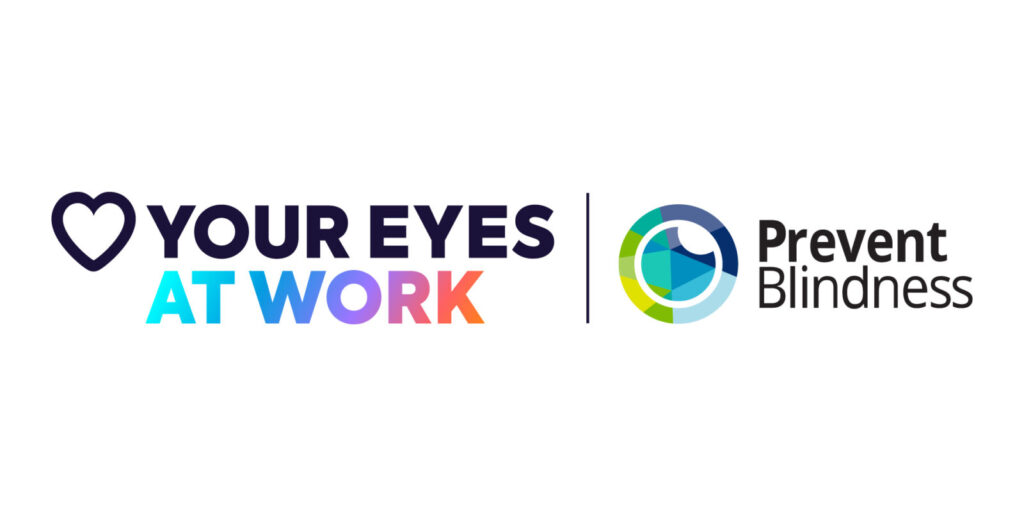Prevent Blindness to Kick Off World Sight Day Activities with a Reception on Capitol Hill, and Hold Series of Vision Screening and Eye Health Education Events with Prevent Blindness Affiliates Across the Country to Promote the Theme, “Love Your Eyes at Work”
Prevent Blindness is once again joining the International Agency for the Prevention of Blindness (IAPB) and fellow eye health organizations across the globe, to raise awareness about vision and eye health issues and promote access to eyecare as part of “World Sight Day” on Oct. 12, 2023. This year’s theme, “Love Your Eyes at Work,” was chosen to help people understand the importance of protecting their vision in the workplace, and to call on business leaders to prioritize the eye health of workers everywhere, according to IAPB.

A new report from the International Labour Organization and IAPB, “Eye Health and the World of Work,” shows that more than 13 million people globally live with vision impairment linked to their work, with an estimated 3.5 million eye injuries occurring in the workplace every year. This amounts to 1 percent of all non-fatal occupational injuries.
Here in the United States, according to the Bureau of Labor Statistic (BLS), while 79 percent of civilian employees with access to vision care plans choose to participate in them, such plans were available to only 28 percent of civilian workers in March 2022 (compared with access to medical care at 73 percent and dental care at 44 percent).
Further, highlighting health disparities, workers with higher average wages had greater access to vision care plans than those with lower wages (11 percent of those with wages in the lowest paid 25 percent have access, compared to 42 percent of those in the highest 25 percent), and employees of larger work establishments had greater access to vision care plans than employees of smaller ones (18 percent of establishments with 1 to 49 workers make vision care plans available to employees, compared to 42 percent of those with 500 workers or more). Importantly, these rates are likely even lower when factoring in agricultural workers, workers in private households, and the self-employed (including gig workers such as Uber and Lyft drivers) – none of which are included in the BLS data.*
While vision care insurance covers comprehensive eye exams and some allowance for glasses or contact lenses, medical/health insurance generally covers services related to the health of the eye (cataracts, glaucoma, diabetes-related eye disease, etc.). However, this may not always cover preventive comprehensive eye exams, and generally does not cover routine eye care related to determining eyeglass or contact lens prescriptions including the costs of the glasses or contact lenses themselves. (For more information, Prevent Blindness offers the Health Insurance and Your Eyes resource on its website.)
Good vision and healthy eyes play a role in the workplace and help our workforce maintain their economic well-being. Without adequate access to eye care through public and commercial insurers, employees may not be able to realize their full personal economic independence and productivity which can exacerbate inequities and shortcomings in the national and global economy.
“This World Sight Day, we call upon employers to examine the benefits they offer their employees, insurers to consider expanding their vision and eye health offerings, and federal and state policy makers to prioritize our nation’s eye health and safety in their healthcare policy actions,” said Jeff Todd, president and CEO of Prevent Blindness. “All those working to support themselves and their families, while contributing to America’s economy, deserve access to eye care that can help them enjoy productive and engaging lives and reap the full benefits of their professional work.”
To kick off this year’s World Sight Day activities, Prevent Blindness will be hosting a World Sight Day reception on Sept. 21 at the Willard InterContinental Hotel in Washington, DC. Featured guests include Peter Holland, CEO of IAPB, who will speak on the purpose of World Sight Day, and share highlights from the “Eye Health and the World of Work” report, and Vivian Fridas, the National Industries for the Blind public policy specialist and manager of the Advocates for Leadership and Employment Program, who will share her personal journey as an individual with progressive sight loss and a child of immigrants, and the impact that workplace accommodations had on her ability to remain at work and to help others in a similar position. Members of the Congressional Vision Caucus are invited to attend.
A Congressional briefing on eye health and the workplace will also be a highlight of the World Sight Day activities. Prevent Blindness and the Prevention of Blindness Society of Metropolitan Washington, greater Washington’s vision health leader and educator, are also planning to host a free vision screening and eye health education event as part of World Sight Day activities later in the year.
Prevent Blindness and its affiliates will also be hosting various free vision screenings and education events across the country, emphasizing workplaces that include smaller businesses and the self-employed. These activities are supported by funding from Horizon Therapeutics and Genentech.
Leading up to World Sight Day, Prevent Blindness will be sharing personal stories on its social media channels from alumni of the Prevent Blindness ASPECT Patient Engagement Program. The program, which stands for “Advocacy, Support, Perspective, Empowerment, Communication, and Training,” equips participants with knowledge, skills, and confidence to become advocates for vision and eye health at the individual and interpersonal, community, and societal levels. Participants include patients, care partners, and professionals.
*The Bureau of Labor Statistics defines “civilian workers” to include private industry and state and local government employees. Excluded are federal and quasi-federal employees, military personnel, agricultural workers, volunteers, unpaid workers, individuals receiving long-term disability compensation, those working overseas, workers in private households, the self-employed, workers who set their own pay (e.g., proprietors, owners, major stockholders, and partners in unincorporated firms), and family members paid token wages.
